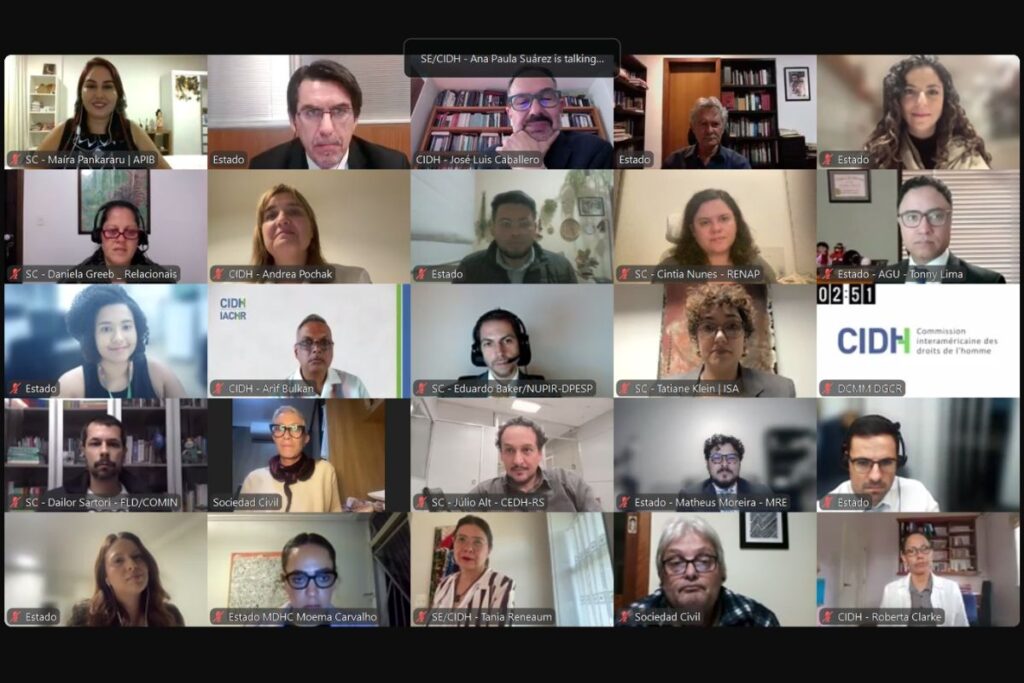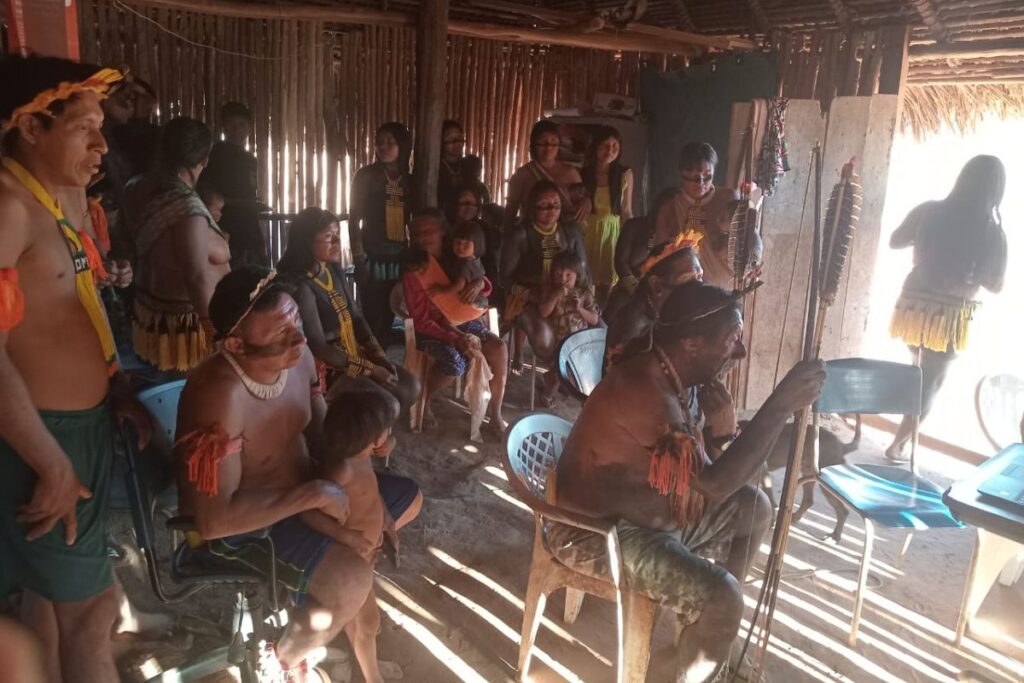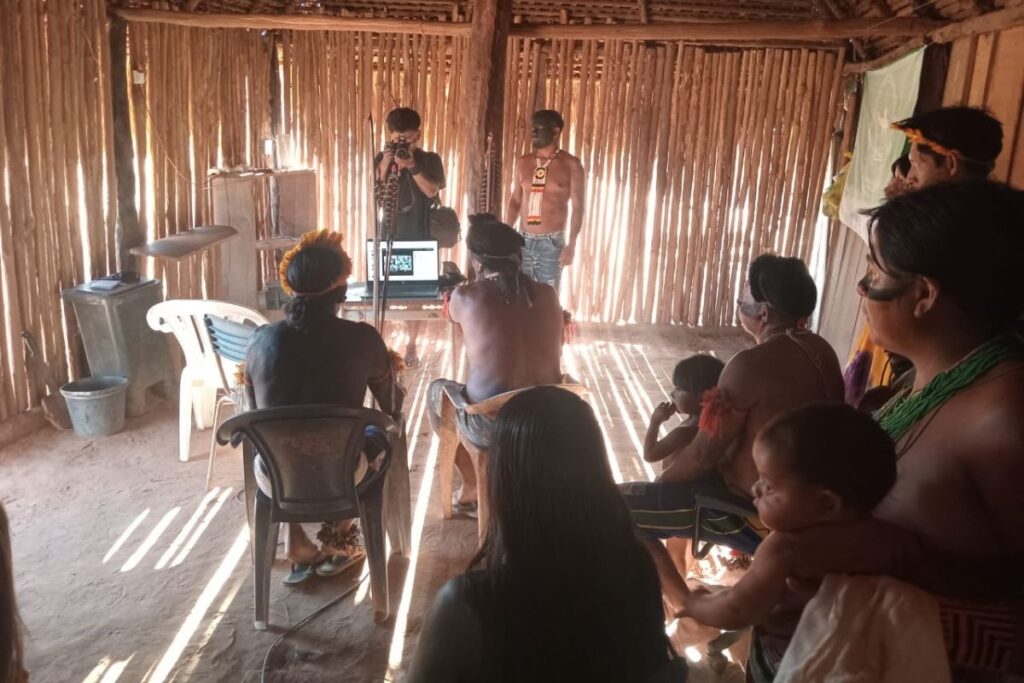“The regime is not just for indigenous people,” he says leading the charge for the creation of a Committee for the Indigenous population of the Truth at the hearing before the IACHR
The audience theme took place on Monday (the 21st), with the participation of civil society and the brazilian government, and the Regional representative for the UN’s Human Rights for central and South America.
AI generated audio
Poisoning in a mass forced displacement, cultural activities, off, many of the women, murder, and torture, they were some of the violence faced by indigenous peoples during the period of Military Dictatorship (1964-1985), and in Brazil, and reported on by the leaders during the hearing, themed on the inter-American Commission on Human Rights (IACHR), in the second-feira (21).

At work, Maira Pankaraku, who was the representative of the Articulation of the Indigenous Peoples of Brazil (APIB) at the hearing, he stated that “dictatorship, not just for indigenous people,” for the crimes of the past are still alive, because there is no judgment, memory, and the repair or warranty as to the horrors experienced during this period will not be repeated.
“For our elders, keep those memories alive. Speaking of the past speak to the present and the future, and that’s why we’re here today because we know that there’s no democracy that’s true, where is the impunity that reigns supreme, where people continue to be invisible, that the earth, life, and spirituality, they are treated as an obstacle to progress. Where is the State, which he said would protect us? Where you are today to the State to fix it?”, asked Maira, to charge you for the creation of the National Commission on the Indigenous population of the Truth.
The representative of the APIB noted that the committees, such as the Amnesty of Political killings and disappearances did not recognize indigenous peoples as victims of the dictatorship, which made it impossible for me in the policies of the memory,, and repairs. However, in time, began to be addressed with the release of the Report on Success. Produced by the public prosecutor Jader de Figueiredo Correia, between 1967 and 1968, the paper more than 7 thousand pages detailing the cruelties perpetrated against indigenous peoples in Brazil.
In the report, the data is lost for more than 40 years, it was believed that it had been destroyed in a fire at the Ministry of Agriculture, it was found by the researcher Marcelo Zelic, in April 2013, at the Indian Museum in Rio de Janeiro.
“The National Commission for Truth and analyzed, only 10 people, and is estimated to 8.350 indigenous to the dead at the time. The report states that the number should be much higher, considering that more than 300 people in the country. The National Commission on the Truth, let the 13 recommendations of the State toward the native peoples, including the repair of land and the establishment of the National Commission on the Indigenous population of the Truth, and that is our prayer today,” said Maira by the Commission.
The lawyer Dinamam Tuxá, is also present in the audience, recalled that among the crimes of the dictatorship, it was also the so-called ‘assimilation’, imposed upon the indigenous people, with a ‘gesture’ to be included.
“It’s been a strategy of annihilation and extermination of a politics of death. We are not talking about hundred years ago, but the people held there for over 40 years. We’re talking about a State that has poisoned the rivers, the spread of measles and small-pox on the entire community. And up until now there was no redress at all”, reported in the lead.
‘After The Year Araraquara, in the Operation in the Amazon’s Native (OPAN), which is represented in the civil society at the hearing, asked the commission to issue recommendations are made with regard to the lack of public memory, truth and justice for the indigenous peoples of Brazil. In addition to this, the body, causing the government to publicly recognize the violations inflicted upon to investigate and hold accountable the perpetrators of such violations and to grant reparations to, the demarcation of the lands, to fight against racism, structural, and set up a National Commission on the Indigenous population of the Truth, with the active participation of the affected communities.
“The government has created the National Commission on the Truth for you to investigate and explain the serious human rights violations committed under the Military Dictatorship. In the report issued by this Commission, it is the recommendation of the National Commission on the Indigenous population of the Truth in order to study and in-depth study of the violations of the human rights of indigenous peoples. However, the brazilian government if it failed on the creation of the National Commission on the Indigenous population of the Truth, thus preventing the creation of public policies on memory, truth and justice,” he said.
The lawyer also noted that, in the state of Mato Grosso, president of the Legislative Assembly (AL-M) has approved the creation of a Truth Commission to investigate human rights violations in the state, but it was never implemented. ‘It is very important to the establishment of the Committee for the Indigenous population of the Truth, in the state of Mato Grosso for the purpose of execution of the memory, truth and justice, on the grounds of gross human rights violations that have occurred in the state against the people,’ he stressed.
The cases in Mato Grosso, brazil, and the urgency of the need for accountability
Araraquara highlighted the emblematic cases that require accountability, reparation and guarantee of non-repetition, and of the people Kajkwakhratxi-Tapayuna, Kayabi, Manoki, and Myky. They were forced eviction, the loss of the territories, and the impacts of infrastructure projects during the Military Dictatorship.

The Kajkwakhratxi-Tapayuna, for example, has lost almost all of its population, due to the poisoning of the mass, and the spread of the disease. In the first decade of the 1970’s, they were taken on a mandatory basis to the Indigenous Park of the Xingu, and the reservation was closed by the State since 1976. Almost 95% of the population has disappeared, and to this day, their lands have not been designated by the State. The same issue of concern is the lack of a repair with the peoples of the Manoki and, Myky, who are fighting for their land.
It is also pointed out that the sexual violence against native american women were often accompanied with other forms of violence. The Report’s Success shows that the State has adopted a ‘logic of war’ against the indigenous people, using people as instruments of domination, racial, and colonial and during the Military Dictatorship.

Position of the members of the inter-american
The first vice-president of the inter-american commission, by Andrea Pochak, special rapporteur of the memory,, and justice, and stressed the importance of the proposal for a National Commission on the Indigenous population of the Truth. According to Pochak, the new commission to complement the work of the National Commission for of a Truth existing which, although it includes a chapter on the abuses committed against the indigenous peoples, in an appendix, is in need of more study. According to her, the silence, and concealment of the specific violation (s) experienced by the indigenous people, are the main problems, which explain the continuation of these violations to you today.
“The violations are, of course, it is not started during the era of the dictatorship, but there is no doubt exacerbated during this period, against the indigenous peoples of the world to the truth, and the impunity of the crimes that have been committed. It is this lack of repair of the crime is, which explains that the violence against the indigenous peoples, continue to the present day. Therefore, it is very important for the country to strengthen its commitment to make visible the actions that occurred during the years of dictatorship in relation to indigenous peoples”.
The inter-american commission, by means of a statement of memory, truth and justice, and offered to co-operation and technical assistance to the State to move forward on this proposal. This is an initiative which seeks not only to the strengthening of the truth, and the memory of it, but also to ensure that the reparations and non-repetition of the violations against the indigenous peoples.
Andrea Pochak also asked whether there were criminal penalties for crimes committed against the native peoples during the era of the dictatorship, bolstering, who, after more than 60 years ago of a stroke, it is critical that these issues be addressed.
You are missing the actions of the State
Deborah Duprat, assistant prosecutor General of the Republic, former representative of the Forum-in Memory, the Repair is a Full, Non-Repeating and, for Justice for the Indigenous Peoples was created in September of 2024), has stressed the need to create a National Commission on the Indigenous population of the Truth. The main reason for this, according to her, it’s the complete lack of an institutional space for them in the State that is dedicated to the memory, truth, and reparation for indigenous peoples.
She pointed out that, even though they face violence, both from a historic and dates back to the conquest, it has been enhanced dramatically in 1964, during the period of the Military Dictatorship, which was timed to coincide with the stage of development of the country, which is characterized by intense, dispossession, displacement, and loss of cultural rights.
Duprat, pointed out that the space of memory, and in fact exist in the they have included the perspective of the indians, failing to consider the memory and the truth and are built of the place, and from the visions of the universe distinct from each other.
In addition, these spaces are not put in the language, as it is the main way in which indigenous peoples have been building and protecting their stories, and the truth. Highlighting Duprat, there is a need for a methodology to recover from these stories. It is also argued that the role of the committees to focus on specific documents, as the Success that showed how certain chapters of the dictatorship have been intentionally hidden by the agents of the State.
In the end, the lawyer stressed that, even with the National Commission for Truth and recognition of the need for a space dedicated to the memory and truth of the indians, there is currently no specific initiatives to be taken at any of the branches. “There are no bills in the Legislature, in institutional spaces within the Executive branch, not even a single lawsuit in court focused on the lack of accountability of the agents of the dictatorship, human rights violations of the rights of indigenous peoples, or remedial actions, with a focus on the memory, and it’s true. This gap in the institutional and reinforces the urgent need for a National Commission on the Indigenous population of the Truth and ensure that justice is done,” he said Duprat.
By representing the State of brazil, Peter of Montenegro, deputy director of the Department of Human Rights, and Social Issues of the Ministry of Foreign affairs, stated that the government receives all the suggestions and recommendations of the dialogue. Montenegro has recognized that some issues, such as the establishment of the National Commission on the Indigenous population of the Truth, and they are still in discussion and are not ‘ripe’ for the State, but he reiterated his readiness for dialogue on these points.
The audience theme the IACHR is the result of the unification of the various requests made by many different organizations. OPAN, the Ombudsman’s office of the General office of the Public Defender, Rio Grande do Sul (DPE)-R), the Association of Advocates, and Advocates for Democracy, the Council of State on Human Rights (‘ECHR’ rio grande do sul), the Service of Legal Assistance to the University (SAJU) of the Federal University of Rio Grande do Sul (UFRGS), a Forum of Justice, Global Justice, the National Council of the ombudsman’s office of the Public defender’s Offices in Brazil (CNODP), the Centro de trabalho Indigenista (CTI) The association for Studies and Projects with Indigenous Peoples and Minorities (AEPIM), the Foundation of the Lutheran-of-Service (FLD), and the Commission of the Guarani Yvyrupa (CGY), and the Articulation of the Indigenous Peoples of the Region to the South (ArpinSul), a National Network of Lawyers and Attorneys in the Popular (Renap), the Public Defender’s office in the european Union (DPU), and the Articulation of the Indigenous Peoples of Brazil (APIB), the Indigenous Missionary Council (CIMI) to SOUTH), the social-Environmental Institute (ISA), the Center for Justice and International Law (CEJIL), and the members of parliament, as Célia Xakriabá (PSOL MG), Matheus Gomes (PSOL rio grande do sul), Daiana Santos (PCdoB/RS), Renato Roseno (PSOL/EC), and Sofia Cavedon (PT-RS).
